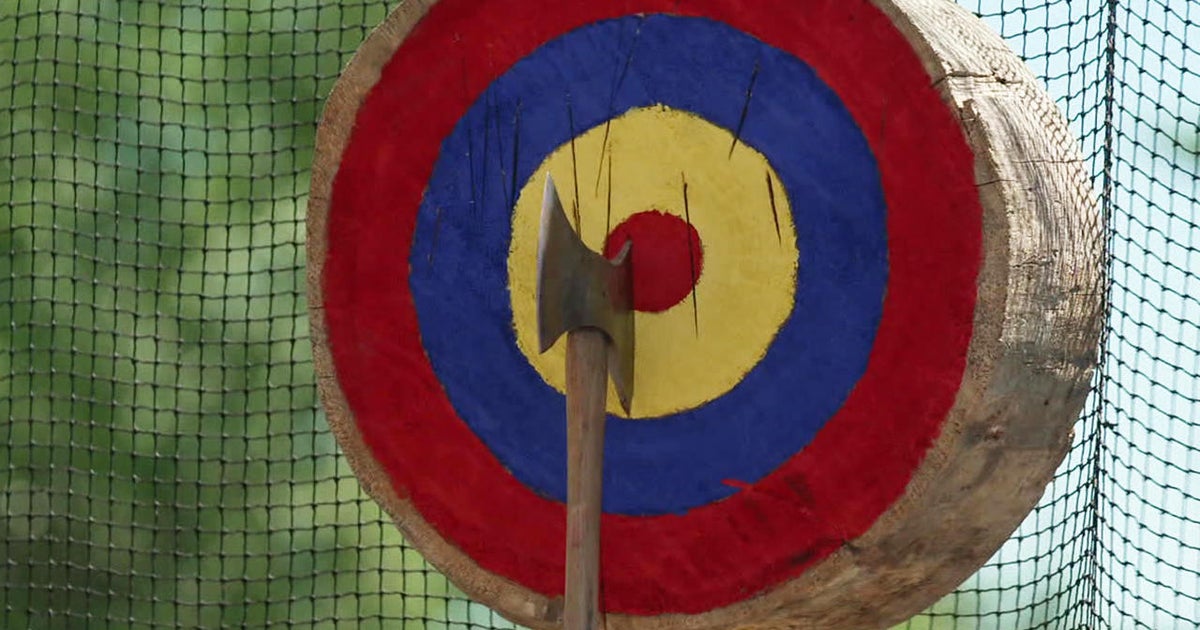At the Lumberjack World Championships, there is never a dull moment. Razor-sharp axes and saws of all sorts slice through logs of aspen. When the competitors aren’t chopping wood, they’re climbing it, up to 90 feet in the air, racing across it, rolling on it.
Over the course of one summer weekend in Wisconsin, there are more than 20 different events.
The festivities begin with a ceremonial log-roll lighting of the torch. “This has been called the ‘Olympics of the forest,'” said Nancy Knutson, who does marketing for the Lumberjack World Championships. “This this year we’ve got competitors from the Czech Republic, Sweden, Japan, Canada, and the United States.”
CBS News
The Lumberjack World Championships have been held in the small town of Hayward, Wisconsin since 1960. “If it weren’t for lumberjacks, we wouldn’t be standing here,” Knutson said.
“Logging was the industry of Hayward?” asked correspondent Conor Knighton.
“It was. It was the reason why Hayward is here.”
More than a century ago, lumberjacks came to this part of Wisconsin to log the white-pine forests. Here, and in timber towns all across the country, lumberjacks would occasionally wager on who could chop the fastest or climb the highest. Those informal contests eventually morphed into a full-on sport.
Today, competitive lumberjacking can be found everywhere from local fairs and festivals to internationally-televised events.
CBS News
Matt Cogar is a full-time lumberjack athlete, who competes and trains year-round. He’s traveled from his home in Grafton, West Virginia, to events across the world with his trusty axes in tow.
Knioghton said, “You’ve got a bag full of six axes. What kind of murderer does the TSA think you are?”
“It’s always challenging traveling on airplanes and stuff,” Cogar laughed.
CBS News
While there is some prize money involved, the vast majority of these competitors have other jobs. They do it for the love of logging. “It’s super-hard to make a living at competitive lumberjack sports right now,” Cogar said. “You have to travel, and you have to win. That’s probably the hardest part!”
CBS News
But Cogar makes winning look easy. He’s got two world records and has taken home seven overall titles at the Stihl Timbersports U.S. Championship. The first time he won first place, he beat out his second cousin, Arden Cogar Jr., who lives a couple of hours away from Matt. They frequently train together.
Arden was racking up records and titles when Matt was just a kid. “The axe and saw has taken me around the world,” said Arden. “I have been to Europe 26 times, and I’ve never had to pay for one trip.”
In-between competitions, Arden is racking up billable hours as an attorney. His office is home to several mementoes from his father’s career. Arden Cogar Sr. was one of the first nationally-known lumberjack athletes, with records set in the 1970s that still haven’t been broken.
“My father was not an educated man,” Arden said. “My father stopped going to school when he was in the third grade. But he always wanted me to get as much education as I possibly could because he wanted me to do something different than what he did. The sport was about the only thing we had in common. And so, the reason why I love it so much is because that’s how I got to know my dad.”
Over the years, the sport has expanded to include a growing number of lumberjills. One of the best is Martha King; she won the women’s all-around at the World Championships in 2019.
“The women cut several chopping events,” she said. “My favorite is the underhand – that’s where you stand on a block and chop between your feet.”
“That seems terrifying, though: What if something goes wrong? Like, the most could wrong in that!” Knighton laughed.
“I don’t even think about that anymore,” King replied. “My mom used to not be able to watch me at all. She’d say, ‘I just have to close my eyes and listen for you to be done.'”
CBS News
Back home in Chadd’s Ford, Pennsylvania, King works for her family’s tree service business. It’s a job which provides an unlimited supply of practice wood. It also provides a link to the world which produced these wood-chopping techniques.
“Every event that we do, every discipline that we compete in, is based on a traditional practice in forestry,” King said. “Once the tree is down on the ground, it might be 100, 150 feet long. How are you gonna move that thing? So, that’s where the underhand chop comes into place.”
King made the finals in all of her events in Wisconsin this year, and took fifth place overall in the women’s division. Lumberjills Erin Lavoie and Stephanie Naud tied for first.
Matt Cogar won nearly all of his events, taking home his third men’s overall World Championship title.
CBS News
It’s a small enough world that most of these athletes know each other; they see each other at all the same events, events where – who knows? – a future lumberjack or jill athlete may just be sitting in the stands.
King said, “We’re highly competitive, but at the end of the day, if we want to see the sport succeed, we’ve gotta work together. It’s a wonderful community, and it’s really enriched my life.”
For more info:
Story produced by Aria Shavelson. Editor: Carol Ross.
For all the latest Automobiles News Click Here
For the latest news and updates, follow us on Google News.

